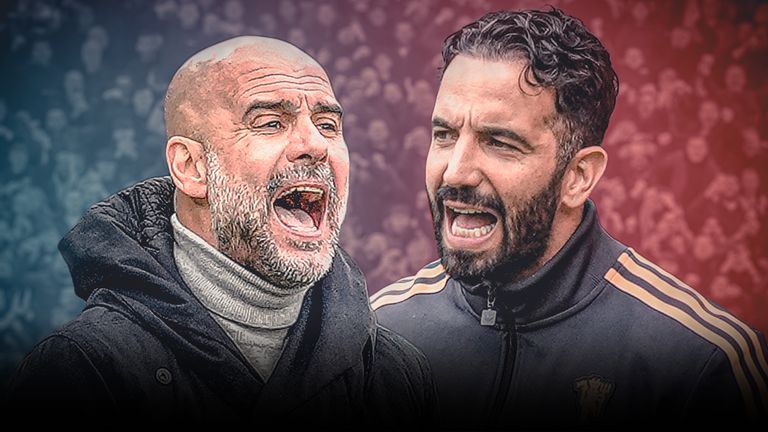
A new-look European Super League (ESL) could contain up to 80 teams in a multi-divisional format, but what else do we know so far? Sky Sports News answers the key questions…
What has been announced?
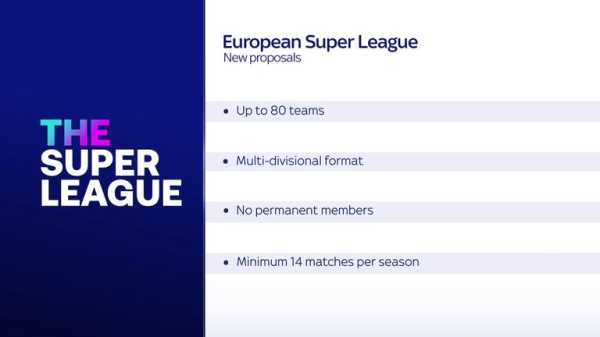
A22 Sports Management, which is the company created by Barcelona, Real Madrid and Juventus to sponsor and push through legislation for the ESL, has released its 10-point principles for the competition.
The competition’s chief executive, Bernd Reichart, told German newspaper Die Welt that a new-look, open European Super League could contain up to 80 teams in a multi-divisional format.
The competition would be based on sporting performance only with no permanent members and teams would be guaranteed a minimum of 14 matches per season, which would not be an increase in the total number of matches played by clubs per season.
- New plans for European Super League revealed
- ‘Big Six’ PL clubs agree to join 2021 Super League
- ‘Big Six’ PL clubs withdraw from 2021 European Super League
- Super League: Fans’ reaction to 2021 announcement
'The European Super League is like a bad smell you can't get rid of'
Sky Sports News’ Kaveh Solhekol:
“A22 Sports Management is a company backed by three clubs: Real Madrid, Barcelona and Juventus. They were three clubs that were part of the 12 clubs who tried to set up the European Super League 18 months ago. That was a spectacular disaster, it fell apart in a matter of days. They’ve gone away and haven’t given up on this grotesque dream they’ve got to set up a European Super League.
“Last time, their PR was absolutely terrible, their communications strategy was atrocious. They’ve improved that by setting up this A22 Sports Management company and realising videos on social media.
“The other thing they really got wrong was that their league was effectively a closed shop. It was going to be 15 clubs who were always going to be members of the European Super League plus five clubs who could qualify for it annually. There was a huge backlash against that. They’ve come back with new proposals now, telling us there will be promotion and relegation.
“Their dream is now to have these European Super Leagues made up of up to 80 teams across Europe and apparently there is going to be a little bit or promotion and relegation, but actually it will be the same team playing over and over again.
“They’re very worried about the power of the Premier League, it has effectively become the global super league and these clubs are desperate to do something about it which is why they haven’t given up on their dream of setting up a European Super League.
“What we’re hearing today is PR. We shouldn’t be talking about plans that are going to happen, this is a PR strategy, going back over what they did 18 months ago but a lot of the main players have left. The three that remain are trying to do it again with better PR and an element of promotion and relegation.”
So there would be promotion and relegation?
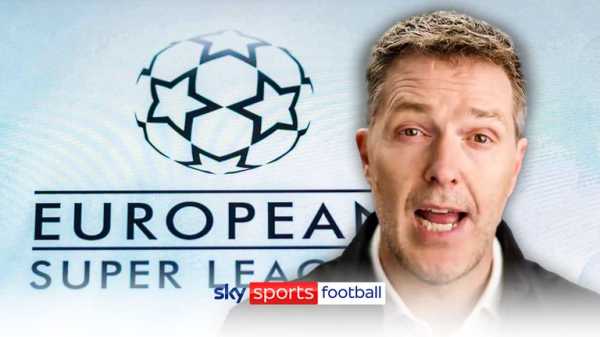
A22, the organisers of the latest European Super League proposals, explain their revised plans to change the structure and governance of European football
The biggest opposition to the original ESL plan in April 2021 was because it would be a “closed shop” with no promotion or relegation.
Trending
- Pep: I’m convinced Man City are innocent | PL rivals conspiring against us
- Ten Hag challenges ’emotional’ Garnacho: We need you to score
- Transfer Centre LIVE! Raya rejects Brentford deal amid Spurs, Man Utd interest
- Levy admits Spurs transfer errors | ‘Mistakes impact future seasons’
- Klopp urges players to show Liverpool are ‘special’ against Everton
- Qatari investors consider Man Utd bid | Four ‘serious’ bids expected next week
- PL Predictions: Chelsea to draw another blank at West Ham
- England drop Smith vs Italy, Farrell moves to fly-half | Willis recalled to start
- Merson Says: Arsenal must win ‘biggest game of the season’ vs Brentford
- Jones responds to Borthwick comments: ‘Keep blaming me’ | ‘More pain for England’
- Video
- Latest News
A very important principle in English football is that success on the pitch is rewarded, maintaining the “sporting integrity” of competitions.
So, the ESL organisers have announced there will not be a closed shop and there would be promotion and relegation with up to 80 teams from across Europe playing in three divisions with no permanent members.
Also See:
However, when you drill down into that, promotion and relegation will only be via the bottom few places in the lowest of those three divisions the ESL is proposing. Therefore, the suggestion is potentially three clubs from across the whole of Europe will be promoted into the lowest of the three European Super Leagues.
Does this make it really an “open” competition?
It is also worth pointing out 96 teams play in the group stages of the Champions, Europa and Europa Conference Leagues, and many more play in the qualifying rounds.
From the 2024/25 season the number of teams playing in the groups stages will go up to 108.
Would there be more matches in a season? Is player welfare being considered?
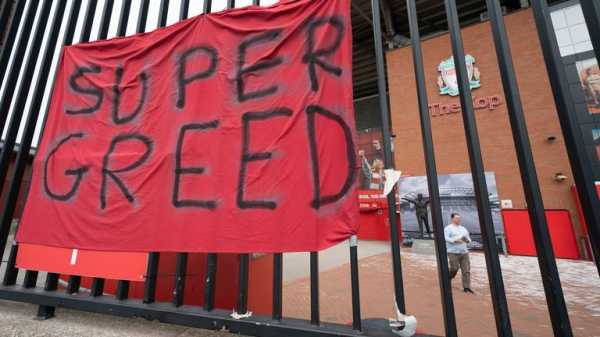
Rob Dorsett explains why there is more to the new proposals for promotion and relegation in the latest plans for a European Super League than initially announced
A22 has said “player health must be at the centre of the game”, and promises there will be no increase in the number of matches currently played.
How does that work in England, if clubs play an additional 14 games per season?
Manchester City, for example, have currently played six Champions League games this season. They face RB Leipzig in the first knockout round in a fortnight with the tie being played over two legs. If they win that then they would reach the quarter-finals (played over two legs), then potentially the semi-finals (also played over two legs) and a one-off final.
That would mean City would play 13 games if they went all the way to the final with the new ESL proposals suggesting teams would have a minimum of 14 games per season.
What money is involved?
It is being suggested a minimum of €400m-a-year (£355m) extra would be generated by this competition. It is claimed the ESL would pay more than UEFA does to women’s and grassroots football across Europe.
The Premier League currently generates and pays £1.6bn in solidarity payments over three years, so that is more than £500m-a-year shared in solidarity to women’s football, the EFL and grassroots football just in England, compared with the £355m which the ESL is talking about, shared across the whole of Europe.
What’s the reaction in Europe?
The idea of a European Super League is still being pursued primarily by Barcelona, Real Madrid and Juventus.
Reichart, the CEO of A22, has said: “The foundations of European football are in danger of collapsing. It’s time for a change.
“It is the clubs that bear the entrepreneurial risk in football. But when important decisions are at stake, they are too often forced to sit idly by on the sidelines as the sporting and financial foundations crumble around them.”
At the moment, clubs in Spain and Italy are struggling financially, whereas the Premier League isn’t. We saw this in the recent transfer window where Premier League side Chelsea smashed the British transfer record.
In total, Chelsea splashed over £323m on eight players in January – that’s more than the clubs in the Italian, German, French and Spanish top flights combined.
What's the reaction been?
Sky Sports News’ Kaveh Solhekol:
“The most eye-catching reaction has been from LaLiga. The president of LaLiga, Javier Tebas, is very outspoken, staunchly anti-European Super League. He has made his feeling very clear even though he is up against two powerful clubs in Real Madrid and Barcelona.
“LaLiga released a statement saying: ‘The Super League is the wolf in the story of Little Red Riding Hood. It is disguising itself as an open and meritocratic competition, but underneath there is still the same selfish, elitist and greed driven project. Don’t let their tales fool you.’
“Today is about PR, this is being driven by Real Madrid, Barcelona and Juventus because effectively they’re jealous of the success and power of the English Premier League.”
What about in England? What’s the appetite for the ESL among England’s elite clubs?
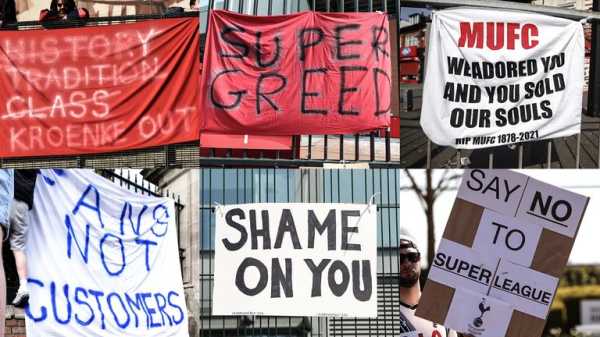
Image: Plans for the initial European Super League faced fierce opposition from supporters
The mood of the biggest Premier League clubs has changed.
With the league now stable and new TV deals in place, this seems to have placated some of England’s biggest clubs, who wanted a bigger slice of the pie that they help more than most to generate.
Those in charge of the big six clubs are also still stung by the public animosity to the idea of the ESL first time around.
Remember, when the initial plans were announced, there were protest marches in the streets and at grounds here in England, whereas there were no such protests in Europe.
Will the ESL proposals be discussed at the PL shareholders meeting?
Sky Sports News senior reporter Rob Dorsett:
“A regular Premier League shareholders meeting is taking place in London on Thursday.
“Will the new ESL proposals be discussed?
“It wasn’t originally on the agenda, but I suspect it might be now. – if nothing else, in private discussions between club bosses.”
Could the Premier League clubs join again?
A European Super League is a total non-runner without the involvement of English clubs and it would be impossible for them to join as things stand.
Page one of the Premier League handbook has the revised owners’ charter which states clearly:
“We are collectively committed to the Premier League and recognise our responsibility to support it. We will not engage in the creation of new competitive formats outside the Premier League’s rules”
The UK government also wants to set up an independent football regulator which will ban clubs from joining breakaway leagues.
What happens next?
A22 has challenged UEFA and FIFA’s right to block the formation of the European Super League and sanction the competing clubs in the courts, arguing the governing bodies are abusing a dominant position under EU competition law
The European Court of Justice (ECJ) is due to give its final ruling in the case later this year, but a non-binding opinion delivered by the Advocate General in the case in December said rules allowing UEFA and FIFA to block the formation of new competitions was compatible with EU law.
Although it is not guaranteed, the ECJ usually follows the view of the Advocate General.
Will it succeed?
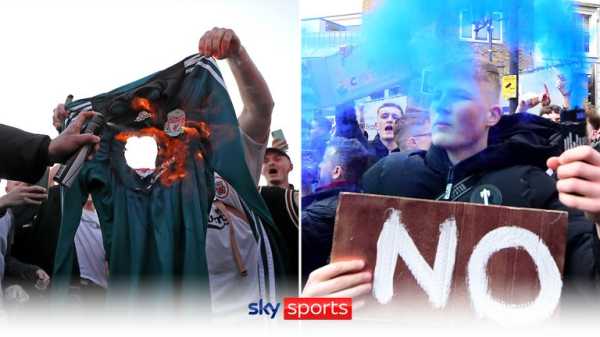
A timeline of how the first version of the European Super League fell apart as all six Premier League clubs withdrew from the competition in a chaotic 48 hours
Sky Sports News’ Kaveh Solhekol:
“I would say the chances of it happening are somewhere between slim and none. To have a European Super League that anyone is ever going to watch, you’re going to need to have English clubs in it like Arsenal, Liverpool, Manchester United, Manchester City, Chelsea.
“These Premier League clubs cannot join a breakaway league. The Premier League handbook has the owners’ charter which is something all the owners of Premier League clubs have had to sign. In that charter, point nine says, ‘We are collectively committed to the Premier League and recognise our responsibility to support it. We will not engage in the creation of new competition formats outside the Premier League’s rules’.
“The government white paper that is going to come out which will recommend setting up an Independent Regulator for football will make it absolutely clear that clubs cannot join a breakaway Super League either.
“Last time they tried it, Arsenal, Chelsea, Liverpool, Manchester City, Manchester United and Tottenham all thought it was a fantastic idea. It fell apart in a matter of days and were all fined.
“In my opinion, this is never going to happen because the Premier League clubs cannot join it.
“A22 Sports Management is effectively saying UEFA are anti-competitive, why shouldn’t other people be allowed to set up leagues? What they want to do is replace one cartel with another cartel. Instead of UEFA running the game in Europe, they want it to be run by Real Madrid, Barcelona and Juventus.”
The story of the European Super League
European Super League – Timeline
1990s — Wealthy European clubs make veiled threats of breaking away into a Super League to pressure UEFA into giving them more Champions League money and format changes in their favour.
2008 — European Club Association created to make long-term peace with UEFA and lock club leaders into Champions League consultation.
November 2018 — Real Madrid-backed Super League plan revealed in Football Leaks series using hacked documents.
2019 — ECA-backed plan for semi-closed Champions League in 2024 fails amid backlash by leagues and mid-ranking clubs.
October 2020 — Outgoing Barcelona president Josep Bartomeu reveals Super League plan in resignation speech, reportedly urged on by Real Madrid president Florentino Perez.
December 2020 — UEFA works on a 36-team Champions League plan to start in 2024 that gives clubs the extra games and money they have demanded.
January 2021 — Reports emerge of Real Madrid-backed Super League plan with financier JP Morgan Chase. UEFA and FIFA unite to oppose, threaten bans for players who take part.
March 8 2021 — ECA chairman Andrea Agnelli of Juventus praises UEFA’s proposed Champions League changes, calls the 36-team, single-standings format “beautiful.”
March 29-31 2021 — ECA-UEFA meetings to sign off on the 36-team Champions League format. Super League clubs start pushing for more financial control of the competition than UEFA is offering. UEFA president Aleksander Ceferin rebuffs their demands in rift with Agnelli.
April 16 2021 — ECA board and UEFA’s club competitions committee sign off on Champions League changes with no dissent ahead of expected decision at meeting of UEFA executive committee.
April 17 2021 — Rumours of imminent Super League plan emerge. Ceferin later reveals that Agnelli stopped taking or replying to his phone calls.
April 18 2021 — Reports of a Super League announcement sparks a backlash by former players and France president Emmanuel Macron. The 12-team Super League is later announced in coordinated statements from the clubs after most fans in Europe are asleep. Agnelli resigns as ECA chairman and from the UEFA executive committee.
April 19 2021 — UEFA executive committee confirms the 36-team Champions League revamp. British government warns of new legislation on club ownership to help block the Super League. Ceferin denounces the “snakes” who betrayed UEFA, warns Super League players could be banned from their national teams. Liverpool manager Jurgen Klopp says he dislikes the Super League. Fans protest at Liverpool’s stadium and at Leeds, where the team is playing that night.
April 20 2021 — Real Madrid president Perez, who would be Super League chairman, breaks his silence on an overnight Spanish show. He claims the project would save European football. At UEFA’s annual meeting later that morning, FIFA president Gianni Infantino says he disapproves of the Super League project. Ceferin delivers a strong speech against the club owners while also inviting some in England to change their minds. The other 14 Premier League clubs in England meet to discuss the six rebels. The project cracks in the evening. Manchester City and Chelsea are first to withdraw. Manchester United vice-chairman Ed Woodward, a leading agitator, announces he will leave his job later that year. By midnight, all six English clubs are out.
April 21 2021 — Atletico Madrid, Inter Milan, AC Milan and Juventus drop out, leaving only Real Madrid and Barcelona. Juventus and AC Milan both signal that there is a future for the Super League.

Win £250,000 with Super 6!
Another Saturday, another chance to win £250,000 with Super 6. Play for free, entries by 3pm.
Sourse: skysports.com
